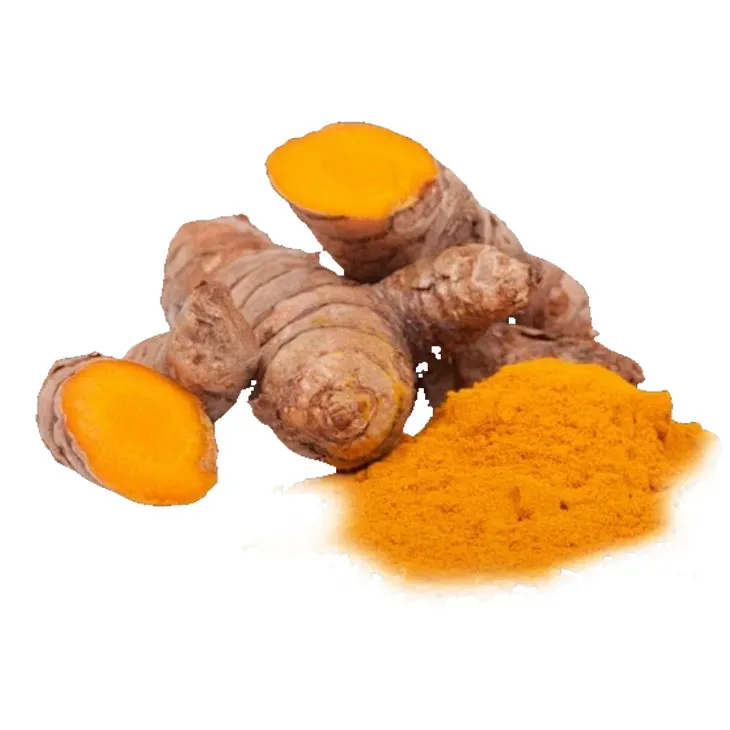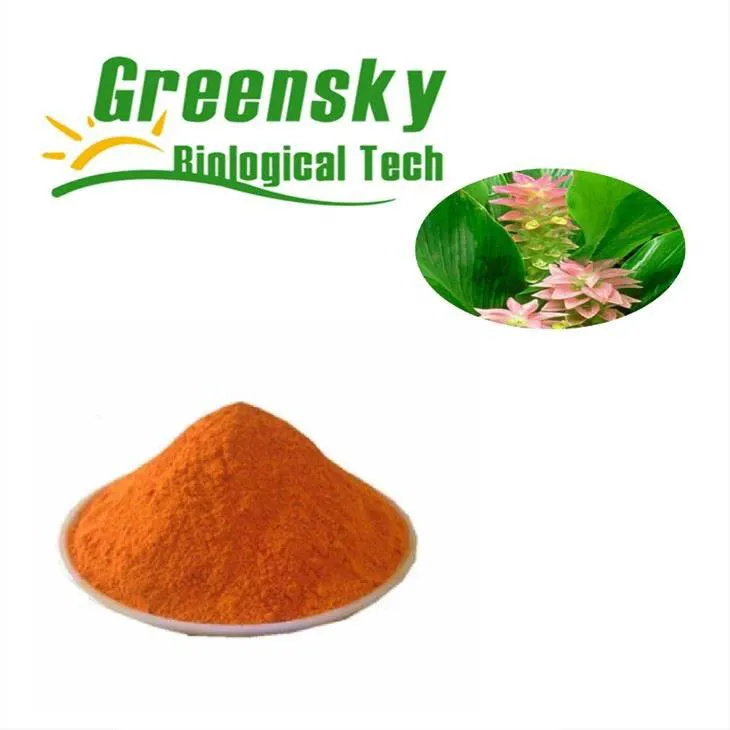- 0086-571-85302990
- sales@greenskybio.com
Have you heard of curcumin? Five unexpected health benefits.
2024-11-12

Introduction
Curcumin, a natural compound derived from the turmeric plant, has been used for centuries in traditional medicine, particularly in Ayurvedic and Chinese medicine. In recent years, scientific research has begun to uncover a wealth of potential health benefits associated with this golden - hued substance. This article will explore five unexpected health benefits of Curcumin that are backed by scientific evidence.

1. Anti - Inflammatory Properties
Curcumin is a powerful anti - inflammatory agent. Inflammation is a natural response of the body's immune system to injury or infection. However, chronic inflammation can lead to a host of health problems, including heart disease, diabetes, and arthritis.
At the molecular level, curcumin inhibits the activation of certain transcription factors, such as nuclear factor - kappa B (NF - κB), which play a key role in the inflammatory response. By suppressing NF - κB, curcumin can reduce the production of pro - inflammatory cytokines, such as interleukin - 1β (IL - 1β) and tumor necrosis factor - α (TNF - α).
Studies have shown that curcumin can be effective in treating various inflammatory conditions. For example, in patients with rheumatoid arthritis, curcumin supplementation has been shown to reduce pain and improve joint function. In addition, curcumin may also be beneficial for those with inflammatory bowel diseases, such as Crohn's disease and ulcerative colitis.

2. Heart Health
Curcumin has several properties that contribute to heart health.
Lowering Cholesterol
One of the ways curcumin benefits the heart is by helping to lower cholesterol levels. It can inhibit the production of cholesterol in the liver by interfering with the activity of certain enzymes involved in cholesterol synthesis, such as HMG - CoA reductase.
Moreover, curcumin can also increase the uptake of low - density lipoprotein (LDL) cholesterol by macrophages in the artery walls, preventing the build - up of plaque. This reduces the risk of atherosclerosis, a condition in which the arteries become narrowed and hardened due to the accumulation of fatty deposits.
Blood Pressure Regulation
Another aspect of heart health that curcumin affects is blood pressure regulation. It can relax the smooth muscle cells in the blood vessels, leading to vasodilation. This helps to lower blood pressure and improve blood flow throughout the body.
Research has shown that curcumin supplementation can significantly reduce systolic and diastolic blood pressure in hypertensive patients. By maintaining normal blood pressure levels, curcumin can reduce the risk of heart attacks, strokes, and other cardiovascular diseases.

3. Potential Cancer - Preventive Effects
While curcumin is not a cure - all for cancer, it shows great promise in cancer prevention.
Antioxidant Activity
One of the mechanisms by which curcumin may prevent cancer is through its antioxidant activity. Free radicals are highly reactive molecules that can damage DNA and other cellular components, leading to mutations and the development of cancer. Curcumin can scavenge free radicals and protect cells from oxidative damage.
For example, curcumin has been shown to protect against oxidative damage in cells exposed to carcinogens such as cigarette smoke or environmental pollutants.
Cell Cycle Regulation
Curcumin can also interfere with the cell cycle, preventing abnormal cell division. It can induce cell cycle arrest in cancer cells, giving the body's immune system a chance to recognize and eliminate these abnormal cells.
Studies have found that curcumin can inhibit the growth of various cancer cells, including breast, colon, and prostate cancer cells. However, more research is needed to fully understand its potential as a cancer - preventive agent and to determine the optimal dosage and delivery methods.

4. Boosting Brain Function
Curcumin has a positive impact on brain function, which has implications for cognitive health and neurodegenerative diseases.
Enhancing Neuroplasticity
Neuroplasticity refers to the brain's ability to change and adapt throughout life. Curcumin can enhance neuroplasticity by promoting the growth of new neurons and synapses in the brain.
It does this by increasing the levels of brain - derived neurotrophic factor (BDNF), a protein that plays a crucial role in neuronal survival, growth, and differentiation. Higher levels of BDNF are associated with improved learning, memory, and mood.
Protecting Against Neurodegenerative Diseases
Curcumin may also protect against neurodegenerative diseases such as Alzheimer's and Parkinson's. In Alzheimer's disease, the accumulation of amyloid - beta plaques and tau tangles in the brain is a hallmark feature. Curcumin has been shown to reduce the formation of amyloid - beta plaques and prevent the aggregation of tau proteins.
In Parkinson's disease, curcumin can protect dopaminergic neurons from oxidative stress and inflammation, which are thought to play a role in the development of the disease.

5. Improving Digestion
Curcumin can have a beneficial effect on the digestive system.
Stimulating Bile Production
Curcumin stimulates the production of bile in the liver. Bile is important for the digestion and absorption of fats in the small intestine. By increasing bile production, curcumin can help improve fat digestion and prevent the build - up of fat in the liver.
This is particularly relevant for those with conditions such as non - alcoholic fatty liver disease (NAFLD), where excessive fat accumulates in the liver.
Reducing Gastrointestinal Inflammation
As mentioned earlier, curcumin has anti - inflammatory properties. In the digestive tract, it can reduce inflammation in the gut lining, which is beneficial for those with inflammatory bowel diseases or other gastrointestinal disorders.
It can also help regulate the gut microbiota, promoting a healthy balance of beneficial and harmful bacteria in the gut. A healthy gut microbiota is essential for proper digestion, immune function, and overall health.
Conclusion
Curcumin, a compound from turmeric, offers a wide range of unexpected health benefits. From its anti - inflammatory properties to its potential in cancer prevention, heart health, brain function, and digestion, curcumin has the potential to be a valuable addition to a healthy lifestyle.
However, it is important to note that while the research on curcumin is promising, more studies are needed to fully understand its mechanisms of action and to determine the optimal dosages for different health conditions. Additionally, curcumin supplements should be used with caution, especially in those with underlying health conditions or those taking medications, as it may interact with certain drugs.
FAQ:
What is curcumin?
Curcumin is a compound that is derived from turmeric. Turmeric is a spice commonly used in cooking, especially in Asian cuisine. Curcumin gives turmeric its characteristic yellow color and is responsible for many of its potential health - promoting properties.
How does curcumin fight inflammation?
Curcumin has anti - inflammatory properties. It can inhibit the activity of certain enzymes and proteins in the body that are involved in the inflammatory response. By doing so, it helps to reduce inflammation at the cellular level, which may be beneficial for various conditions related to chronic inflammation, such as arthritis.
What are the ways curcumin aids heart health?
Curcumin can benefit heart health in multiple ways. It may help to lower cholesterol levels, particularly LDL (bad) cholesterol. It also has antioxidant properties that can protect the blood vessels from oxidative stress and damage. Additionally, curcumin may improve endothelial function, which is important for normal blood vessel dilation and blood flow.
Is there evidence that curcumin can prevent cancer?
While more research is needed, there are some indications that curcumin may have potential in cancer prevention. In laboratory studies, curcumin has shown the ability to interfere with cancer cell growth, proliferation, and survival. It may also affect various signaling pathways involved in cancer development. However, it is important to note that curcumin is not a substitute for standard cancer treatments, and more clinical trials are required to fully understand its role in cancer prevention.
How does curcumin boost brain function?
Curcumin may enhance brain function in several ways. It has antioxidant and anti - inflammatory effects in the brain, which can protect neurons from damage. It may also increase levels of brain - derived neurotrophic factor (BDNF), a protein that is important for the growth, survival, and differentiation of neurons. This could potentially improve cognitive function, memory, and mood.
Related literature
- The Potential of Curcumin in Health and Disease"
- "Curcumin: A Review of Its' Effects on Human Health"
- "Health - Promoting Properties of Curcumin: A Comprehensive Review"
- ▶ Hesperidin
- ▶ citrus bioflavonoids
- ▶ plant extract
- ▶ lycopene
- ▶ Diosmin
- ▶ Grape seed extract
- ▶ Sea buckthorn Juice Powder
- ▶ Beetroot powder
- ▶ Hops Extract
- ▶ Artichoke Extract
- ▶ Reishi mushroom extract
- ▶ Astaxanthin
- ▶ Green Tea Extract
- ▶ Curcumin Extract
- ▶ Horse Chestnut Extract
- ▶ Other Problems
- ▶ Boswellia Serrata Extract
- ▶ Resveratrol Extract
- ▶ Marigold Extract
- ▶ Grape Leaf Extract
- ▶ blog3
- ▶ Aminolevulinic acid
- ▶ Cranberry Extract
- ▶ Red Yeast Rice
- ▶ Red Wine Extract
-
Curcumin Extract
2024-11-12
-
Maca Extract
2024-11-12
-
Natural grape seed extract
2024-11-12
-
Sugarcane Extract
2024-11-12
-
Phyllanthus Emblica Extract
2024-11-12
-
Okra Extract
2024-11-12
-
Chaste Berry Extract
2024-11-12
-
Resveratrol extract
2024-11-12
-
Baicalin
2024-11-12
-
Yohimbine Bark Extract
2024-11-12





















